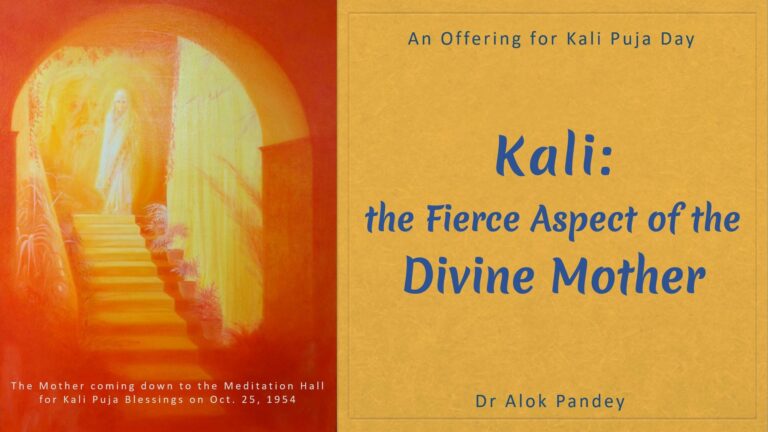We take up the Mother’s commentary to the following aphorism of Sri Aurobindo:
JNANA 9: What the soul sees and has experienced, that it knows; the rest is appearance, prejudice and opinion.
This amounts to saying that all knowledge which is not the result of the soul’s vision or experience is without true value.
But the question immediately arises—it was, in fact, put to me — “How do we know what the soul sees?”
Obviously there is only one solution: to become conscious of one’s soul. And this completes the aphorism: unless one is conscious of one’s soul one does not have true knowledge. Therefore the first effort must be to find the soul within, to unite with it and allow it to govern one’s life.
Some people ask, “How do we know whether this is the soul?” I have already answered this question several times. Those who ask this question, by the very fact of asking it, prove that they are not conscious of their souls, because as soon as you are conscious of your soul and identified with it, you have a positive knowledge of it and you no longer ask how you are to know. And that experience can neither be counterfeited nor imagined; you cannot pretend to be in contact with your soul — it is something which cannot be contrived or counterfeited. When the soul governs your life, you know it with absolute certainty and no longer ask any questions.
But the usefulness of the aphorism we have just read is to make you understand that everything you think you know, everything you have learnt, anything that has come to you in your life through personal observation, deduction, comparison — all that is a very relative knowledge on which you cannot found a durable and truly effective way of life.
How many times have we repeated this: all that comes from the mind is wholly relative. The more the mind is educated and has applied itself to various disciplines, the more it becomes capable of proving that what it puts forward or what it says is true. One can prove the truth of anything by reasoning, but that does not make it true. It remains an opinion, a prejudice, a knowledge based on appearances which are themselves more than dubious.
So there seems to be only one way out and that is to go in search of one’s soul and to find it. It is there, it does not make a point of hiding itself, it does not play with you just to make things difficult; on the contrary, it makes great efforts to help you find it and to make itself heard. Only, between your soul and your active consciousness there are two characters who are in the habit of making a lot of noise, the mind and the vital. And because they make a lot of noise, while the soul does not, or, rather, makes as little as possible, their noise prevents you from hearing the voice of the soul.
When you want to know what your soul knows, you have to make an inner effort, to be very attentive; and indeed, if you are attentive, behind the outer noise of the mind and the vital, you can discern something very subtle, very quiet, very peaceful, which knows and says what it knows. But the insistence of the others is so imperious, while that is so quiet, that you are very easily misled into listening to the one that makes the most noise; most often you become aware only afterwards that the other one was right. It does not impose itself, it does not compel you to listen, for it is without violence.
When you hesitate, when you wonder what to do in this or that circumstance, there come the desire, the preference both mental and vital, that press, insist, affirm and impose themselves, and, with the best reasons in the world, build up a whole case for themselves. And if you are not on the alert, if you don’t have a firm discipline, if you don’t have the habit of control, they finally convince you that they are right. And as I was saying a little while ago, they make so much noise that you do not even hear the tiny voice or the tiny, very quiet indication of the soul which says, “Don’t do it.”
This “Don’t do it” comes often, but you discard it as something which has no power and follow your impulsive destiny. But if you are truly sincere in your will to find and live the truth, then you learn to listen better and better, you learn to discriminate more and more, and even if it costs you an effort, even if it causes you pain, you learn to obey. And even if you have obeyed only once, it is a powerful help, a considerable progress on the path towards the discrimination between what is and what is not the soul. With this discrimination and the necessary sincerity you are sure to reach the goal.
But you must not be in a hurry, you must not be impatient, you must be very persevering. You do the wrong thing ten times for every time that you do the right thing. But when you do the wrong thing you must not give up everything in despair, but tell yourself that the Grace will never abandon you and that next time it will be better.
So, in conclusion, we shall say that in order to know things as they are you must first unite with your soul and to unite with your soul you must want it with persistence and perseverance.
Only the degree of concentration on the goal can shorten the way.
14 November 1958 [CWM 10: 23-26]



